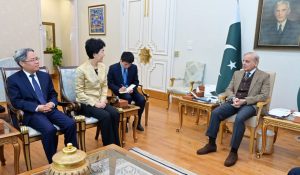ISLAMABAD – The Supreme Court of Pakistan issued a detailed judgment in the former National Assembly deputy speaker ruling case, explaining the reasons behind its decision to set aside the controversial move that blocked the no-trust motion against the then PM Imran Khan.
In the detailed verdict, Chief Justice Umar Ata Bandial remarked that Qasim Suri prima facie breached his constitutional duty by dismissing the no-confidence motion against Imran Khan.
The top judge remarked that the April 3 ruling failed to qualify for the protection of the internal proceedings of parliament under Article 69(1) as it was not the outcome of a vote in the National Assembly instead, it was a unilateral decision.
The 111-page judgment reads that the deputy speaker rejected the resolution without any probe and the constitution did not provide any protection to such moves. It added that the cipher was not shown to the court but some portion of the document was presented.
Supreme Court had taken a suo motu notice for the protection and integrity of the Constitution, it said, and further added that it was the responsibility of the executive to decide on the diplomatic cable. The bench maintained that courts always announce verdicts on factual grounds.
Justice Mazhar Alam Miankhel of the apex court in his additional note stated that the sacred trust of exercise of authority was violated by President Arif Alvi, Imran Khan, and other Pakistan Tehreek-e-Insaf (PTI) leaders.
He also urged the parliament to initiate action under Article 6 of the constitution, seeking the charge of high treason against PTI chief, President Alvi, former speaker of the assembly Asad Qaisar, former deputy speaker Qasim Suri and former law minister Fawad Chaudhry.
Miankhel maintained that such blatant transgression of the constitution must bear consequences and the law must take its course.
About the delaying tactics by former speaker Asad Qaisar, the SC judge said such unconstitutional and undemocratic behaviour was unbecoming for a person holding one of the most prestigious constitutional offices. He added that the parliament was “lowered in dignity as well”.
Supreme Court restores Pakistan s National Assembly, terms deputy speaker’s ruling unconstitutional
In early April, the top court restored the National Assembly after it declared the former government’s decision to dissolve the assembly and NA Deputy Speaker Qasim Suri’s ruling against the Constitution.
The court then ordered the assembly to reconvene and vote and PTI chief Imran Khan was then ousted as prime minister after losing a no-confidence vote in parliament following weeks of political turmoil.














